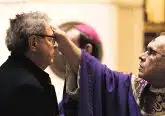A Closer Look: When Christ Calls us, He calls us to die
On Apr. 9, 1945, German Lutheran theologian Dietrich Bonhoeffer was executed by hanging at the Flossenbürg, Germany concentration camp two weeks before American troops liberated the prison. A mere 39-years-old, Bonhoeffer was arrested because he associated with parties who conspired to assassinate Hitler in July 1944. While he was active in the German resistance movement, it is highly doubtful that he had any role in the assassination conspiracy. But in a lawless regime, those details hardly matter. Bonhoeffer believed his call to discipleship compelled him to join the resistance – and that call led to his death.
It might seem odd to commemorate the death of a Lutheran theologian in a Catholic magazine at Eastertime, but as participation in the eternal mind of God, all truth is catholic truth, regardless of who conveys it. And Bonhoeffer said some very “Catholic” things about the suffering, death and the resurrection of Christ. Moreover, his mediation on the call to suffering and discipleship is remarkably harmonious with those of Pope St. John Paul II in his landmark encyclical, The Splendor of Truth.
In his book, Discipleship, Bonhoeffer famously wrote, “Whenever Christ calls us, His call leads to death.” That death necessarily entails suffering if we are to be faithful disciples. “Discipleship is being bound to the suffering Christ,” he continued. “Just as Christ is only Christ as one who suffers and is rejected, so a disciple is only a disciple in suffering and being rejected, thereby participating in crucifixion.”
Bonhoeffer’s further explanation of this point could have been written by a Catholic theologian (or, as some contend, it might have implied Bonhoeffer’s own movement toward Catholicism).
“To be sure,” he wrote, “Christ’s suffering is the only suffering that brings reconciliation.” But because we are called to participate in Christ’s suffering and death – a death that was for the sake of others – so must we also take seriously our responsibility to bear the burdens of others. “As Christ bears our burdens,” Bonhoeffer explained, “so we are to bear the burden of our sisters and brothers.” By participating in the suffering and death of Jesus, “[s]o Christians become bearers of sin and guilt for other people.” This includes forgiving the sins of the other against us – of bearing their guilt. “Forgiving sins is the Christ-suffering required of disciples,” he wrote. “I cannot bear it except by forgiving it, by the power of Christ’s cross, which I have come to share.”
This might seem a shocking assertion. But if we are to take seriously our call to come and die with Christ – if we are sincerely and wholly join our suffering with His – it is a necessarily implication. Christ alone atones, but He calls us to participate in that atonement by being present for others, taking on the suffering of others and forgiving their sins. If we are joined to Christ we must, like Christ, be people for others. This includes bearing their burdens and giving our lives to and for theirs.
And, in the glorious essence of the Christian paradox that life is found in death, only by bearing the other’s burden can we become free.
AUTHENTIC FREEDOM
In The Splendor of Truth, St. Pope John Paul II explains that authentic freedom is found only in the cross of Christ, and that our quest for a false freedom separate from that Cross leads instead to enslavement.
“The Crucified Christ reveals the authentic meaning of freedom,” St. John Paul declares. “He lives it fully in the total gift of himself and calls his disciples to share in this freedom.” This is not the false modern, secular notion of freedom as the liberty to do whatever one wants. Rather, it is the true freedom obtained when we fully embrace the truth that is ordered toward the abundant life of rest in God.
As we truly draw closer to the Cross, and to the crucified Christ who died there, we draw closer to the others to whom we are called to be present; the others whose burdens we are called to bear. And by bearing them, we find our own freedom.
“Freedom is acquired in love,” explains St. John Paul, “in the gift of self.” Christ gave Himself wholly in love by His death. And, thus, He calls us to die by giving ourselves wholly to Him, which necessarily entails giving ourselves to others.
But this call to die is also the call to live, concludes St. Pope John Paul II. Christ’s “crucified flesh fully reveals the unbreakable bond between freedom and truth, just as the Resurrection from the dead is the supreme exaltation of… freedom lived out in truth.” Our faith in dying with Christ is borne up by our
hope in resurrecting with Him. Thus, we find freedom in bearing the burden of others; we find life in sharing the passion of Christ.
In this Easter season, let us pray with hope that Dietrich Bonhoeffer and all who have suffered and died as witnesses to this truth may find the abundant life to which their deaths attest.
 Dr. Kenneth Craycraft is an attorney and the James J. Gardner Family Chair of Moral Theology at Mount St. Mary’s Seminary & School of Theology. He holds a Ph.D. in moral theology from Boston College, and a J.D. from Duke University School of Law.
Dr. Kenneth Craycraft is an attorney and the James J. Gardner Family Chair of Moral Theology at Mount St. Mary’s Seminary & School of Theology. He holds a Ph.D. in moral theology from Boston College, and a J.D. from Duke University School of Law.
This article was printed in the April 2021 edition of The Catholic Telegraph Magazine. For your complimentary subscription, click here.













